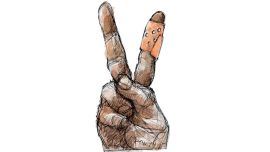The so-called ‘cryptogate’ scandal has rocked Argentina’s political landscape. It began when President Javier Milei – a self-proclaimed “anarcho-capitalist” and economist who prides himself on having curbed Argentina’s endemic inflation –promoted a cryptocurrency “in good faith” that collapsed within hours, causing multimillion-dollar losses.
What happened?
On Friday evening, Milei promoted (or “shared,” according to his version of events) the ‘$LIBRA’ memecoin on social media.
“This private project will be dedicated to encouraging the growth of Argentina’s economy,” he wrote.
Launched that same evening, the cryptocurrency surged to nearly US$5 following Milei’s tweet but then plummeted by 90 percent in value within two hours.
Milei subsequently deleted his original post and stated that he “was not aware of the details of the project.”
During that brief window, the currency saw transactions worth more than US$4.5 billion, according to Javier Smaldone, an IT specialist and well-known digital influencer who exposes pyramid schemes.
The exact amount lost by investors “is subjective and difficult to estimate,” he told AFP. Current estimates put the figure at US$250 million.
Dozens of legal complaints have been filed against Milei and the other parties involved, both in Argentina and the United States.
Meanwhile, opposition lawmakers have announced they will pursue impeachment proceedings over the alleged “crypto-fraud.”
What are the political consequences?
Members of the opposition Unión por la Patria (Peronist) coalition have declared their intention to push for Milei’s impeachment, though they lack the necessary votes to make it happen.
“On a scale of 0 to 10, this possibility is zero,” said political analyst Carlos Germano.
Others are calling for the creation of an investigative committee, a more feasible initiative, while a third proposal from the left seeks to summon the president for questioning in Congress. This would force him to answer questions from lawmakesr. Milei has previously described Congress as a “nest of rats.”
The PRO party, a Milei ally led by former president Mauricio Macri (2015–2019), described the case as “very serious” and said it had “damaged the country’s credibility.”
However, they declined to support impeachment proceedings “at this stage.”
“Clearly, the president has found himself at the centre of a scam that has affected many people, and that warrants a very serious investigation,” Macri stated.
What legal risks does Milei face?
Impeaching a sitting president requires a two-thirds majority in both chambers of Congress.
Adolfo Suárez Erdaire, a lawyer specialising in digital fraud who is investigating the case, told AFP that even if impeachment proceedings were successful,”‘the only political penalty the President would face would be removal from office and disqualification from holding public office in the future.”
However, once his term ends, he could face ordinary criminal charges, with potential sentences of up to six years in prison, as well as civil lawsuits from affected investors seeking damages.
“There is an ongoing legal risk because judicial cases always leave a trail,” he explained.
Who else is involved?
Alongside Milei, the case also involves US businessman Hayden Mark Davis, the CEO of Kelsier Ventures and one of the creators of $LIBRA; Singaporean entrepreneur Julian Peh, who launched the currency via the website ‘vivalalibertadproject.com’; and Argentine citizen Mauricio Novelli, founder of a tech forum that drew the duo to Buenos Aires last October.
Milei himself revealed on X that he had a “very interesting” meeting with Davis at the Casa Rosada on January 30.
“He advised me on the impact and applications of blockchain technology and artificial intelligence in the country,” he wrote in a post on social media.
Novelli is also the co-founder of N&W Professional Traders, a financial training company where Milei taught classes before entering politics.
“I’ve known him for years,” the President said.
What has been Milei’s response?
On Monday night, the TN news channel aired an interview with Milei, which had been recorded earlier that afternoon.
“I didn’t promote it, I shared it,” Milei insisted during questioning, claiming that his endorsement of $LIBRA was done “in good faith.”
“By trying to give Argentines a helping hand, I got a slap in the face,” the President remarked, arguing that those who invest in cryptocurrencies “knew very well the risks they were taking,” just as a gambler does “in a casino.”
“A casino where the machines are rigged by the owner,” Smaldone quipped in response to AFP.
An edited version of Monday’s interview went viral on social media, fuelling further controversy.
In the video, the president and journalist Jonathan Viale can be heard ironically quipping that their questions were prearranged.
However, later in the interview, at the request of members of Milei’s team, the journalist allowed Milei to alter an answer, after conceding that it could cause him “legal trouble.”
related news
by Leila Macor, AFP























Comments